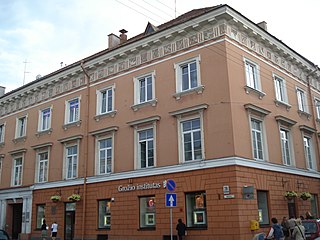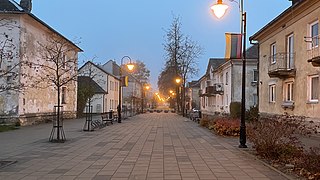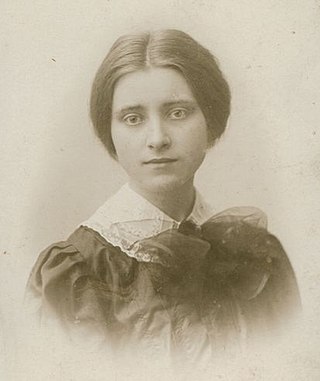
Czesław Miłosz was a Polish-American poet, prose writer, translator, and diplomat. He primarily wrote his poetry in Polish. Regarded as one of the great poets of the 20th century, he won the 1980 Nobel Prize in Literature. In its citation, the Swedish Academy called Miłosz a writer who "voices man's exposed condition in a world of severe conflicts".
Morta was Queen of Lithuania (1253–1262) upon the accession of her husband, King Mindaugas. Very little is known about her life. Probably, Morta was Mindaugas' second wife as Vaišvilkas, the eldest son of Mindaugas, was already a mature man active in international politics when Morta's sons were still young and dependent on the parents. After her death, Mindaugas married her sister, the wife of Daumantas. In revenge, Daumantas allied with Treniota and assassinated Mindaugas and two of Morta's sons in 1263.
The city of Vilnius, the capital and largest city of Lithuania, has an extensive history starting from the Stone Age. The city has changed hands many times between Imperial and Soviet Russia, Napoleonic France, Imperial and Nazi Germany, Interwar Poland, and Lithuania.

Tyzenhauz Palace is an 18th-century mansion located in the city of Vilnius, Lithuania.
Rita Karin was a Polish-born American actress best known for her role as Jackie Mason's mother on the 1989 TV series Chicken Soup. She also appeared as Meryl Streep's Brooklyn landlady who appears at the beginning of Sophie's Choice. Her voice can be heard singing children's songs from the camps in the Holocaust Museum in Washington, D.C.

The Vilna Ghetto was a World War II Jewish ghetto established and operated by Nazi Germany in the city of Vilnius in the modern country of Lithuania, at the time part of the Nazi-administered Reichskommissariat Ostland.

Lithuanian literature concerns the art of written works created by Lithuanians throughout their history.

Lentvaris is a city in eastern Lithuania, 9 km east of Trakai. It is a transportation hub, as several road and rail routes cross here. Lake Lentvaris is nearby.
Esther R. Hautzig was a Polish-born American writer, best known for her award-winning book The Endless Steppe (1968).

Curse of the Blue Tattoo is a 2004 historical novel by L.A. Meyer, the second book in the Bloody Jack series. It continues the story of orphaned London girl, Jacky Faber, in the early 19th century. The novel is preceded by Bloody Jack (2002) and followed by Under the Jolly Roger (2005), In the Belly of the Bloodhound (2006), Mississippi Jack (2007), My Bonny Light Horseman (2008), Rapture of the Deep (2009), The Wake of the Lorelei Lee (2010), The Mark of the Golden Dragon (2011), Viva Jacquelina! (2012), Boston Jacky (2013), and Wild Rover No More (2016).

Kazimierz Sakowicz (1894–1944) was a Polish journalist, soldier and resistance member. A witness to the prolonged Ponary massacre in German-occupied Vilnius, he chronicled much of it in his diary before being murdered in 1944.

Mother Bertranda, O.P., later known as Anna Borkowska, was a Polish cloistered Dominican nun who served as the prioress of her monastery in Kolonia Wileńska near Wilno. She was a graduate of the University of Kraków who had entered the monastery after her studies. During World War II, under her leadership, the nuns of the monastery sheltered 17 young Jewish activists from Vilnius Ghetto and helped the Jewish Partisan Organization (FPO) by smuggling weapons. In recognition of this, in 1984 she was awarded the title of Righteous among the Nations by Yad Vashem.
Stephan Collishaw is an author from Nottinghamshire.

Moshe Shalit was a researcher, journalist, essayist, ethnographer, and humanist of the inter-war period.

Kristina Sabaliauskaitė is an art historian, doctor honoris causa of Vilnius Academy of Arts and one of the most prominent contemporary Lithuanian writers. Born in Vilnius, she has been based in London since 2002. She worked as a foreign correspondent in London and columnist for Lithuania's biggest daily newspaper until 2010. She is best known for her opus magnum historical novel Silva Rerum and the international bestseller Peter's Empress.

Emilija VileišienėnéeJasmantaitė (1861–1935) was a Lithuanian activist. Born to a noble family, she attended the Smolny Institute and lived with her older brother in Saint Petersburg and Caucasus. When her brother became severely ill, they moved to Vilnius where Vileišienė met her husband Antanas Vileišis and became active in Lithuanian cultural life. She was an active member of various Lithuanian organizations, including the Lithuanian Mutual Relief Society of Vilnius, Society of Saint Zita for servants, cultural Rūta Society. During World War I, she was a board member of the Lithuanian Society for the Relief of War Sufferers and was particularly active in organizing relief for war refugees. After the war, she remained in Vilnius and continued active public life despite several arrests by the Polish government. In 1928–1930, she toured numerous Lithuanian American communities collecting donations for the orphans and the poor.

Sofija Čiurlionienė née Kymantaitė was a Lithuanian writer, educator, and activist.
Jadvyga Tūbelienė was one of the founders of the Lithuanian Women's Council, a writer, journalist, head of the Information Bureau in Bern and Paris, Deputy Chief of Mission to Switzerland and married to Juozas Tūbelis, the longest-standing Prime Minister of Lithuania. She was involved in many charity organizations and is considered one of the most influential women in interwar Lithuania. Jadvyga was a member of the Chodakowski noble family.












